

CIL's by State, Territory, Country, International. State Independent Living Council. Home Idaho SILC Vision The Idaho State Independent Living Council aspires to promote a philosophy of independent living, including a philosophy of consumer control, peer-support, self-help, self-determination, equal access, and individual and system advocacy in order to maximize opportunities for individuals with disabilities, and the integration and full inclusion of individuals with disabilities into the mainstream of society.
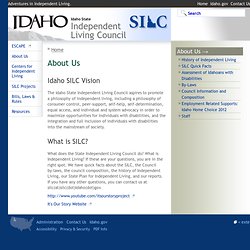
What is SILC? Arizona Statewide Independent Living Council. What is a Center for Independent Living?

Centers for Independent Living (CILs) are non-residential, 501 (c) (3) non-profit corporations. They are consumer-controlled, community-based organizations that provide programs and services for people with all types of disabilities and their families. The goal of CILs is to promote and support opportunities for people with disabilities to fully participate in an integrated community and search for the possibilities to live as they choose. Statewide Independent Living Council of Georgia - Promoting the equal participation of people with disabilities in their societies. The Cultural Perspectives of Independent Living and Self-help Movement of People with Disabilities. The Cultural Perspectives of Independent Living and Self-help Movement of People with Disabilities Yutaka Takamine * * Mr.
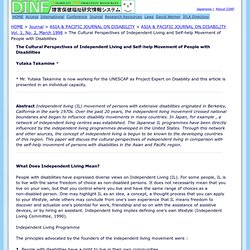
Yutaka Takamine is now working for the UNESCAP as Project Expert on Disability and this article is presented in an individual capacity. Abstract Independent living (IL) movement of persons with extensive disabilities originated in Berkeley, California in the early 1970s. Over the past 20 years, the independent living movement crossed national boundaries and began to influence disability movements in many countries. Independent Living Institute. Missouri Statewide Independent Living Council. Kansas Association of Centers for Independant Living. Centers for Independent Living. Program Office: Rehabilitation Services Administration CFDA Number: 84.132AProgram Type: Discretionary/Competitive Grants Also Known As: CILs This program provides support for the planning, conduct, administration, and evaluation of centers for independent living that comply with the standards and assurances in Sec. 725 of the Rehabilitation Act , consistent with state plans for establishing statewide networks of centers.
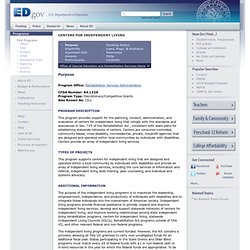
Centers are consumer-controlled, community-based, cross-disability, nonresidential, private, nonprofit agencies that are designed and operated within local communities by individuals with disabilities. ILRU: Independent Living Research Utilization at TIRR - Home page. Independent Living USA - @ ILUSA.com. National Council on Independent Living — Access Center for Independent Living: Ilhist. Reference History of Independent Living by Gina McDonald and Mike Oxford This account of the history of independent living stems from a philosophy which states that people with disabilities should have the same civil rights, options, and control over choices in their own lives as do people without disabilities.
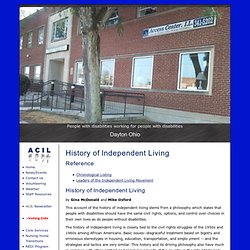
The history of independent living is closely tied to the civil rights struggles of the 1950s and 1960s among African Americans. Basic issues--disgraceful treatment based on bigotry and erroneous stereotypes in housing, education, transportation, and emplo yment -- and the strategies and tactics are very similar. The first social movement was deinstitutionalization, an attempt to move people, primarily those with developmental disabilities, out of institutions and back into their home communities. The next movement to influence disability rights was the civil rights movement. Demedicalization was a movement that began to look at more holistic approaches to health care. References. Youth Taking Charge of Their Own Transition: The Role of CILs presented by Margaretha Vreeburg Izzo Ph.D., on April 20, 2011.
Presented by Margaretha Vreeburg Izzo Ph.D., The Nisonger Center, The Ohio State University, Program Director – Special Education/Transition Services, on April 20, 2011 View Training About the Training The New Community Opportunities Center at ILRU offers three on-demand trainings on the role of the CIL in facilitating and advancing successful youth transition.
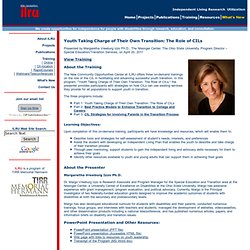
In this program, "Youth Taking Charge of Their Own Transition: The Role of CILs," the presenter provides participants with strategies on how CILs can use existing services they provide for all populations to support youth in transition. It's Our Story.